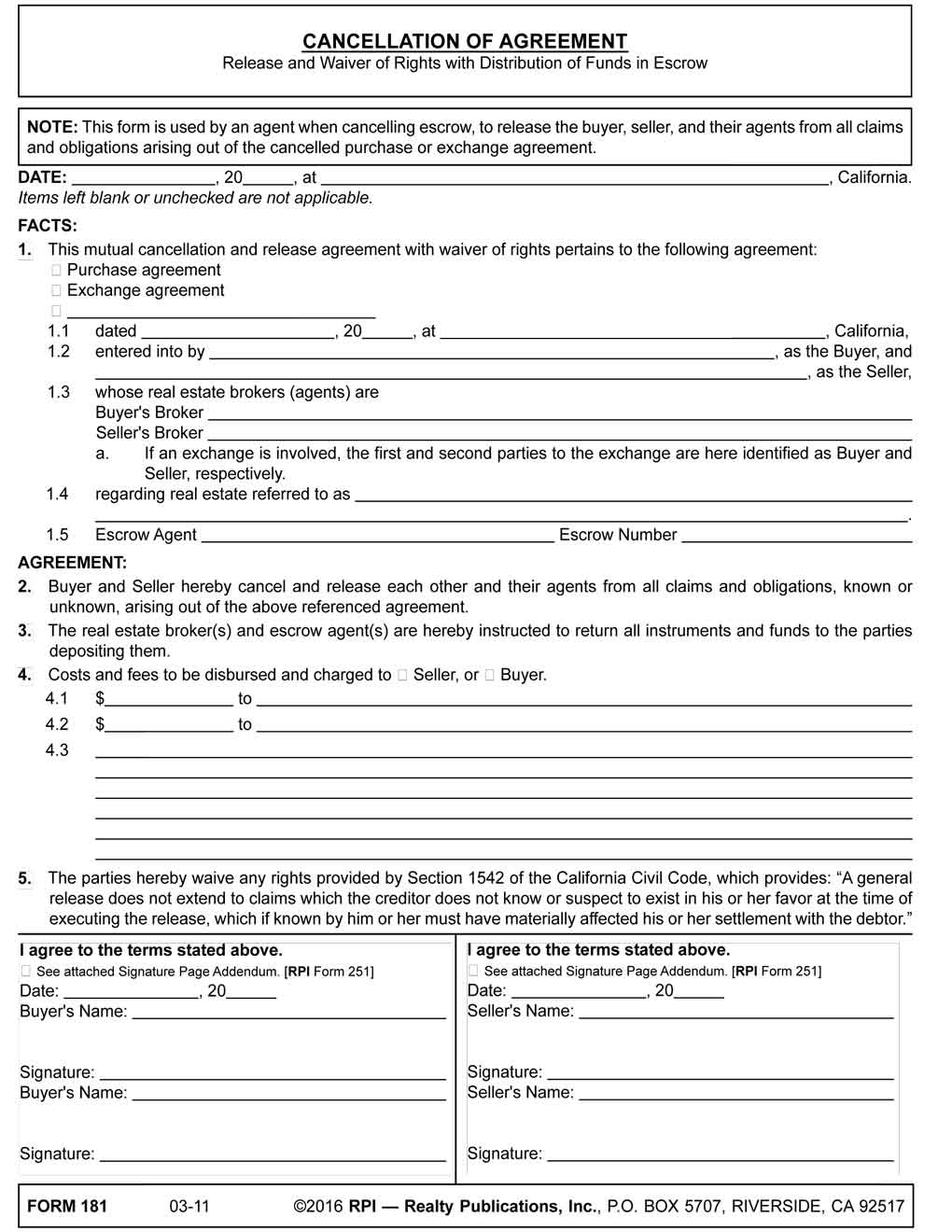This form is used by an agent when cancelling escrow, to release the buyer, seller, and their agents from all claims and obligations arising out of the cancelled purchase or exchange agreement.
Purchase agreement cancellation – termination of right to buy or sell
Cancellation of a real estate purchase agreement and escrow is due either to:
- a breach of the agreement by the other party; or
- the failure of an event to occur or a condition to be approved as called for in a contingency provision.
The act of cancelling is a unilateral agreement since the cancellation of the purchase agreement is undertaken by one person only. Cancellation does away with whatever remains to be performed under the purchase agreement, called termination of the contract.
Thus, a cancellation eliminates any future enforcement of the agreement from the moment of cancellation. However, the cancellation of a purchase agreement does not affect the legal consequences and liabilities for activities and events which preceded the cancellation.
Conversely, rescission of either an unexecuted purchase agreement (i.e., escrow has not yet closed) or of a completed real estate transaction (i.e., escrow has closed) is a bilateral agreement. Under a rescission, both the buyer and seller, acting in concert, retroactively annul the purchase agreement from the moment it was entered into.
While a cancellation merely brings a purchase agreement to a standstill and eliminates future obligations under the agreement, a rescission returns the buyer and seller to their respective positions they held prior to entering into the purchase agreement. When a contract is rescinded, it is as though the parties had never agreed to the transaction. The retroactive return to their former, pre-contract positions is called restoration.
When both the buyer and seller enter into a rescission agreement, the restoration of the buyer and seller to their pre-contract positions eliminates all claims they may have had against each other for conduct which occurred after entering into the purchase agreement and prior to its rescission. A rescission is voluntarily accomplished as part of a mutual agreement to eliminate the purchase agreement, called a release and waiver agreement. [See RPI Form 181]
RPI (Realty Publication, Inc.)’s Cancellation of Agreement – Release and Waiver of Rights with Distribution of Funds in Escrow is:
- a mutual cancellation agreement which releases the buyer, seller and their agents from all claims and obligations, know or unknown, arising out of the cancelled agreement; and
- an instruction to the brokers and escrow to return all instruments and funds to the parties depositing them, less costs and fees incurred. [See RPI Form 181]
Distinguished from a cancellation of the purchase agreement is the unilateral or mutual cancellation of only the escrow instructions, without including any reference to cancellation of the purchase agreement. Often, due to a dispute or failure of a contingency, escrow will not close. Here, escrow will only issue instructions calling for the return of funds and documents to the party who deposited them in escrow. The purchase agreement remains unaffected.
These escrow cancellation instructions, signed by both the buyer and seller, do not need to also call for a cancellation of the purchase agreement. If the purchase agreement is not also cancelled, the cancellation instructions handed to escrow do not interfere with any rights the parties may have to enforce the purchase agreement. Thus, the purchase agreement remains intact to be enforced to buy, sell or recover money losses since it has not been cancelled or rescinded. [Calif. Civil Code §1057.3(e)]
However, negotiations by the agents involved to resolve the misunderstandings or differences and close escrow might not be successful. If the escrow dispute becomes unresolvable, the agents need to consider recommending the buyer and seller terminate the purchase agreement. Here, the property is released and placed back on the market – and the buyer is free to look for another property.
At the same time the buyer and seller cancel the transaction, it may be in everyone’s best interest to also release each other and all the brokers and escrow from any claims they may have against one another, by entering into a cancellation, release and waiver agreement to put the transaction to rest forever. [See RPI Form 181]
Form navigation page published 07-2017. Updated 01-2026.
Form updated 2016.









